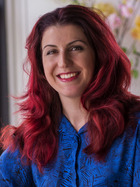- Q.
Can you direct me to information about the risk of thyroid cancer due to X-ray exposure? Are there any precautions I should take, say at the dentist?
A.Having an X-ray can be a regular part of yearly health screening and preventative checkups both in the medical and dental worlds, and it is completely reasonable to consider what precautions should be taken. When you go in to have an X-ray, you encounter several people on your medical team along the way such as radiologists, technicians, nurses, and doctors. The doctor may order the X-ray, the nurse may prepare you for the test, and a technician might set you up with special shields around your neck and abdomen. There may be several opportunities to talk with them about why they are recommending such a scan (taking into account your medical history) and what the risk factors are (such as radiation exposure). Another opportunity to ask questions is when they place the protective shields on you. You may want to ask why they place them on certain areas and not others and what they are specifically shielding.
As for thyroid cancer, it is more likely to develop in people who have been exposed to high doses of radiation, have a history of thyroid cancer in their family, and are 40 years of age or older. But for the majority of people who develop thyroid cancer, the cause is unknown. For more information about thyroid cancer, please visit the National Cancer Institute’s website.
You should speak with your health care team about the possible risks (and precautions that can be taken) when having any procedure, including X-rays. It’s important for you to understand why they are recommending specific procedures and what the risk factors are. X-rays are very different from other scans such as CAT scans and PET scans and your doctor can also talk to you about whether the frequency of these radiology procedures has an effect on your overall radiation exposure risk. Learn more about about radiation exposure and cancer and about different types of imaging tests.
Communication with your health care team is key. How comfortable are you speaking with them about your concerns? Do you feel like you have enough time to ask your questions? Do you feel reassured when they answer your questions? A CancerCare oncology social worker can provide you with support as you consider questions for your health care professionals.
You can read more about dental X-rays and thyroid cancer in a New York Times article. Remember, ask your dentist or health care team about any of your concerns since they know your medical history and are best equipped to answer your questions.
- Q.
I'm looking to speak with other thyroid cancer patients—can you refer me to groups or organizations?
A.Connecting with other people who have been through the same emotions, feelings, and treatments that you have had can help you feel less alone and more understood. Here is a list of organizations that provide support groups and/or peer matching programs for people coping with thyroid cancer:
ThyCa: Thyroid Cancer Survivors' Association, Inc. organizes support groups across the United States, monitors 12 online discussion groups, posts personal profiles and journals of survivors, facilitates an email support group, and runs the Person-to-Person Network, a peer matching program.
Support for People with Oral and Head and Neck Cancer (SPOHNC) strives to raise awareness of issues related to head and neck cancer.
Head and Neck Cancer Alliance (formerly the Yul Brynner Head and Neck Foundation) is a foundation that hosts an online forum, organizes support groups, and sponsors Head and Neck Cancer Awareness Week.
Cancer Hope Network provides free, one-on-one support to patients and their families. They match patients or family members with trained volunteers who have undergone and recovered from a similar cancer experience.
Imerman Angels matches and individually pairs a person touched by cancer with someone who has fought and survived the same type of cancer. Cancer caregivers (spouses, parents, children and loved ones) also receive one-on-one connections with other caregivers and survivors. The service is free and helps anyone touched by any type or stage of cancer, at any age, living anywhere in the world.
And CancerCare offers general online, face-to-face, and telephone support groups for people looking to talk about a wide range of cancer experiences. Our groups are facilitated by oncology social workers.

 Answered by
Answered by